- You are here:
AUCD Home
- News
- View All News
- AUCD Celebrates Down Syndrome Awareness Month
AUCD Celebrates Down Syndrome Awareness Month
October 3, 2016
This October, the Association of University Centers on Disabilities (AUCD) is partnering with the U.S. Department of Education's Office of Special Education Programs (OSEP) and the National Center for Special Education Research (NCSER), the National Down Syndrome Congress (NDSC), the National Down Syndrome Society (NDSS), and the U.S. Department of Health and Human Services' Administration on Intellectual and Developmental Disabilities (AIDD) to celebrate National Down Syndrome Awareness month.
Every Wednesday in October we will share blogs by individuals and groups describing lived experiences, research, and practices related to supporting families and enhancing the development and opportunities of children, youth and adults with Down syndrome. The blogs will cover areas such as important resources and information for new parents of children with Down syndrome; strategies for improving literacy outcomes of students with Down syndrome; and considerations as young adults with Down syndrome transition to post-high school settings. In addition, we will host a Twitter Chat on the final Wednesday in October to provide more information and open the discussion around these and other issues related to Down syndrome.
Together, these activities will showcase the vast possibilities for those with Down syndrome and their families and create a stronger community in which everyone is fully included.
National Down Syndrome Awareness Month Activities
|
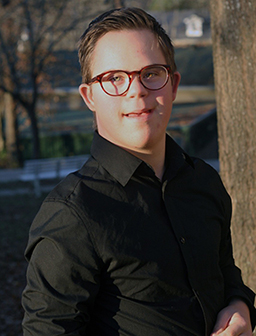 Life as an Ordinary, Fun, Mess: Getting Support and Getting Connected When Your Baby Has Down Syndrome Life as an Ordinary, Fun, Mess: Getting Support and Getting Connected When Your Baby Has Down Syndrome
by Stephanie Meredith, Information Services Director/Medical Outreach Director, Human Development Institute - UCEDD, University of Kentucky
I was just 23 years old when the doctors told me they suspected that my newborn baby had Down syndrome. I remember crumpling into my hospital bed when they took him from my arms and rushed him to intensive care. I worried about what the future would look like for my baby. Would other people be kind? Would he ever go to college and get married? How could we provide him the services he might need?
Read more...
|
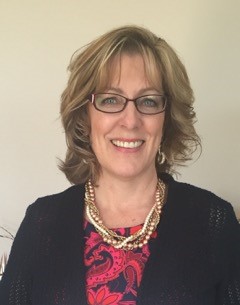 Lessons Learned from Our Daughter and Those Who Support Us Lessons Learned from Our Daughter and Those Who Support Us
by Chris Newlon, Retired Occupational Therapist and Public Speaker for the National Association for Down Syndrome
We knew Rebecca had Down syndrome before she was born, which allowed our family to ask questions, get up-to-date information and decrease some of our fears.
We are forever thankful for the wonderful experiences and people we met during Rebecca's sessions. Our deepest thanks go to Jennifer, Lisa, Traci and, in memory, Gail.
Read more...
|
|
 Enhancing Reading Instruction for Children with Down Syndrome Enhancing Reading Instruction for Children with Down Syndrome
by Wendy Wei, a program assistant in the National Center for Education Research, and Diane Mechner, who worked as an IES intern.
President Obama named two Institute of Education Sciences (IES) grantees as recipients of the prestigious Presidential Early Career Award for Scientists and Engineers (PECASE). Christopher Lemons (Peabody College of Vanderbilt University) and Cynthia Puranik (Georgia State University) were honored in Washington, DC at a White House ceremony this past May, along with 103 other recipients of the award.Dr. Lemons and Dr. Puranik have recently completed an IES-funded project, Enhancing Reading Instruction for Children with Down Syndrome: A Behavioral Phenotypic Approach.
Read more...
|
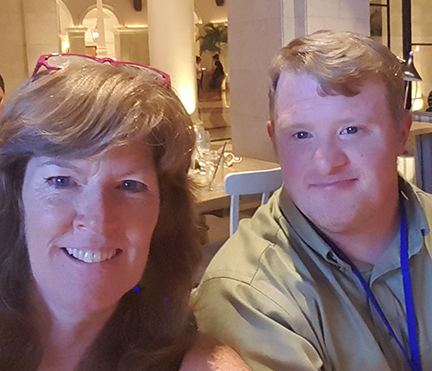 Give Him Chores, with High Expectations! Give Him Chores, with High Expectations!
by Terri Dawson
Thirty-one years ago my husband and I had our second child...a son! We were thrilled! Five weeks later, we were told that he had Down syndrome. Days after that diagnosis, we met with an Early Interventionist at the regional developmental preschool center. There we were, seated in little-bitty chairs with our knees up to our chins, and our hearts in our laps. The Early Interventionist introduced us to the world of special education with these words, "There's this law- called PL 94-142," (now known as IDEA- the Individuals with Disabilities Education Act), "and it will make a huge difference in your son's life." I remember thinking, "I don't want to know about a stupid law --just tell me what I can do to help my son!" Little did I know how important and true her words would come to be!Read more...
|
|
 Children with Down Syndrome and Goal Settings Children with Down Syndrome and Goal Settings
by Colorado State University Developmental Disabilities Lab
Making plans is a quintessential part of parenting. There are school schedules, after-school activities, lunches to pack, and buses to catch. And of course, for families of children with Down syndrome, each year involves teaming up with educators and other providers to devise an Individualized Education Program (IEP). As a parent, it can often feel like a lot of life is spent organizing and planning! Read more...
|
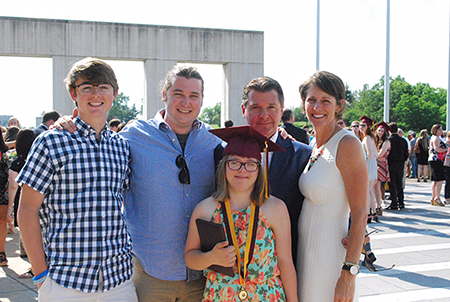 Even Even
Higher
Expect-
tations
by
Jane Gerhardt
We thought we had done a pretty good job prepping our daughter for high school. Anne had friends, she was involved in school and extracurricular activities, though not very interested in school work, she would regularly sit and do her homework without much of a struggle!We weren't prepared for a teacher who demanded even more from us and from Anne. Did she still watch little kid television shows? Play with dress up clothes? Dolls? Sleep with a blanket? Well, maybe a couple of those things. She knew she had to leave her blanket in bed so what was the harm in that? She enjoyed the Disney channel and what were the alternatives?
Read more...
|
|
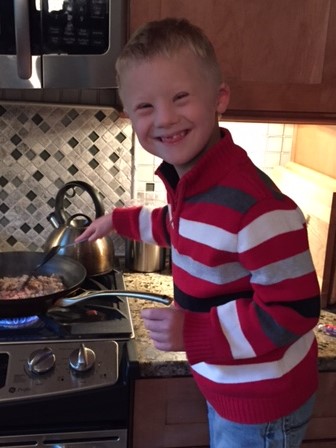 Awareness in Action Awareness in Action
by Allison Wohl
As the mom of a first grader with Down syndrome, I always wonder about the origin of "awareness" months. While many people are aware of Down syndrome, few really know what it means for an individual for the day to day life of the individual who lives with it. We were told very early on that the number one indicator for employment for individuals with disabilities is not which courses a student takes or how they score on tests; it is parent and teacher expectations. For us, that has meant that we always have the opportunity to educate those who come into our son's life, and that means teachers and school personnel as well.
Read more...
|
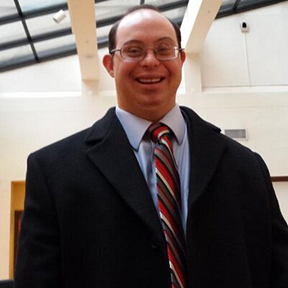 Employment is a Defining Aspect of Adult Life Employment is a Defining Aspect of Adult Life
by David Egan
It connects us to full participation and inclusion in our communities; it fosters a sense of self-worth, opens opportunities for social growth, and leads to greater independence. Employing individuals with intellectual disabilities is a smart business decision and a social responsibility as I told the Senate Health, Education, Labor and Pensions (HELP) Committee in 2011, during the Committee Hearing on Improving Employment Opportunities for People with Intellectual Disabilities. I have surprised my family and many others over the past thirty nine years of my life. Read more...
|
|
 Envisioning Anne's Future Envisioning Anne's Future
by Jane Gerhardt
We sat around a table in a conference room in our 14 year old daughter's middle school. "So how do you envision Anne's future? What do you think she'll be doing for employment and where do you think she'll live?" the transition coordinator asked us. My husband and I were flabbergasted. Anne was still completing What Time Is It? clock face worksheets for homework. Did they really expect us to predict what she would do and where she would live in 15 or 20 years? We couldn't even answer that question about our high school senior. Frankly, maybe we couldn't answer it about ourselves. Read more...
|
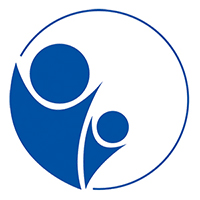 IDDRC Reporter 2016 IDDRC Reporter 2016
The IDDRC Reporter is a once-a-year summary of research conducted by the IDDRC Network programs. This newsletter will highlight some recent advances in Down syndrome research from the Eunice Kennedy Shriver Intellectual and Developmental Disabilities Research Centers (IDDRCs), a network supported by the National Institute of Child Health and Human Development (NICHD) at the National Institutes of Health (NIH). Read more...
|
|
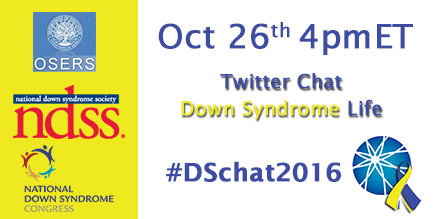
Date: Wednesday, October 26, 4pmET
Moderator: @AUCDnews
Guests: YOU!, OSEP, NDSS, NDSC & others
Missed it watch on storify!
4 easy steps to join our #DSchat2016 Twitter Chat:
- Log-in: log into your Twitter account (or create one).
- Search: Search for the designated hashtag #DSchat2016 of the chat on twitter.com or the Twitter app. Make sure to click “live” or “all tweets” (otherwise you will see only the tweets twitter considers the most important, which makes conversation difficult).
- Find: Look for questions tweeted by @AUCDnews. They will be prefaced Q1, Q2, etc.
- Share: When tweeting, use the designated chat hashtag. If responding to a specific question, preface your answer with A1, A2, etc. as it corresponds to Q1, Q2, etc.
|
|
#DSchat2016 Questions
Q1 (introductions)
Q2: Let's start w a big Q: whether you're a person with DS, sib, parent, or advocate, what's the biggest challenge about DS? #DSchat2016
Q3: What should be the 1st step after diagnosis? Parents, what do you wish you had known when your child was born? #DSchat2016
Q4: What can we all do to make sure every child is part of the activities in the neighborhood? #DSchat2016
Q5: What do we need to do to ensure schools are welcoming to children with #DownSyndrome & other disabilities? #DSchat2016
Q6: What skills are the most important to develop to live an inclusive #DownSyndromeLife? #DSchat2016
Q7: Youth and adults w/ #DownSyndrome: What helps you get and keep a job? #DSchat2016
Q8: What role do siblings play in fostering inclusion/high expectations/friendships/support? #DSchat2016
Q9: How do you work to raise expectations of the abilities of ppl with #downsyndrome? (at home, at work, on policy, etc) #DSchat2016
Q10: What is the best piece of advice you've received (as a youth) or given (as a parent) about your #DownSyndromeLife? #DSchat2016
Q11: What are the biggest misconceptions/hurdles you have to overcome to get people to see ABILITIES? #DSchat2016
Q12: Let's finish w a big Q, too: Whether you're a person w DS, sib, or parent, what is the BEST THING about #DownSyndrome? #DSchat2016
|
|
Partners
- U.S. Department of Education's Office of Special Education Programs (OSEP)
- U.S. Department of Education's National Center for Special Education Research (NCSER)
- The National Down Syndrome Society (NDSS)
- The National Down Syndrome Congress (NDSC)
- U.S. Department of Health and Human Services' Administration on Intellectual and Developmental Disabilities (AIDD)
|
|
Resources
|

 Life as an Ordinary, Fun, Mess: Getting Support and Getting Connected When Your Baby Has Down Syndrome
Life as an Ordinary, Fun, Mess: Getting Support and Getting Connected When Your Baby Has Down Syndrome  Lessons Learned from Our Daughter and Those Who Support Us
Lessons Learned from Our Daughter and Those Who Support Us














